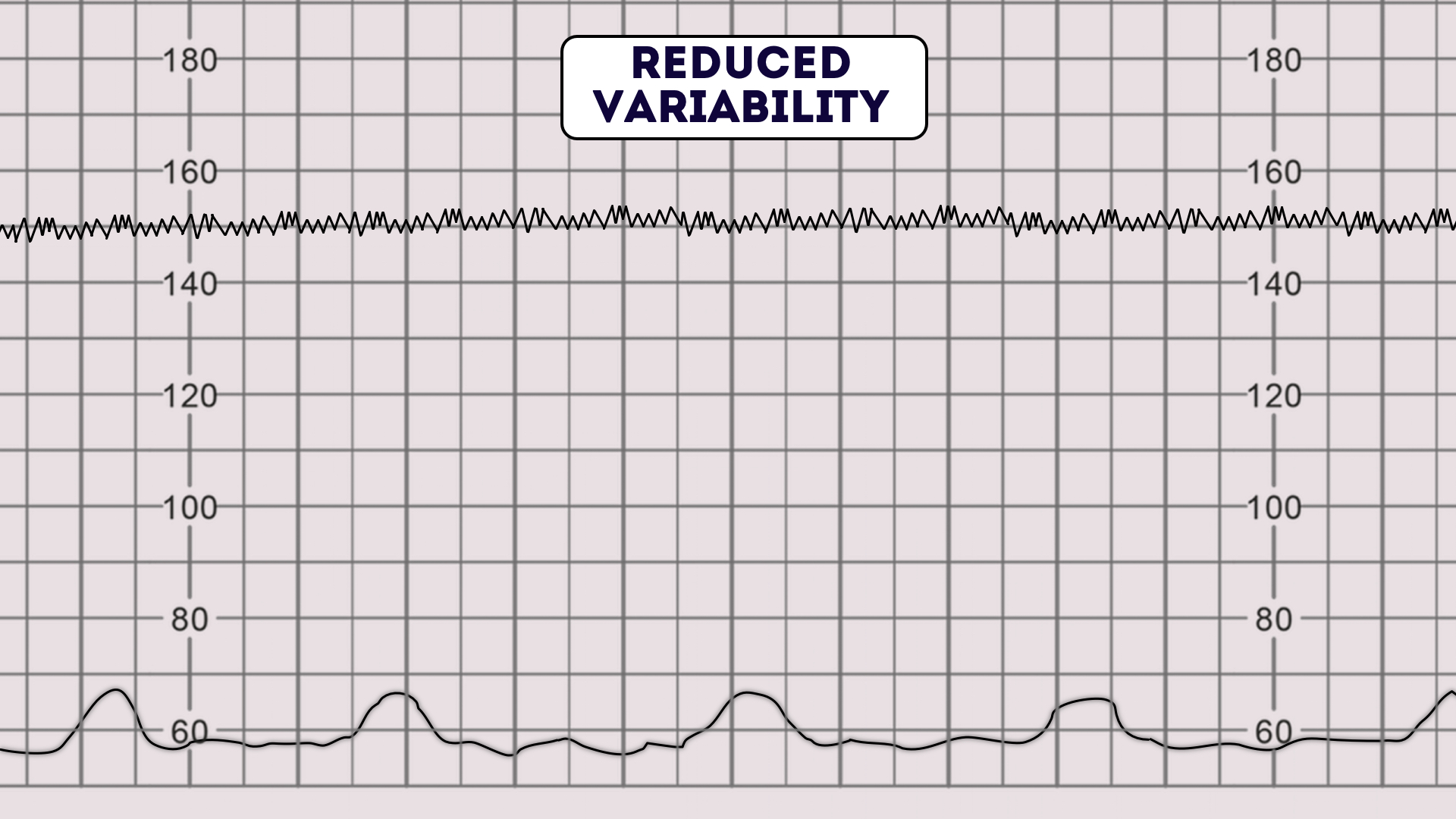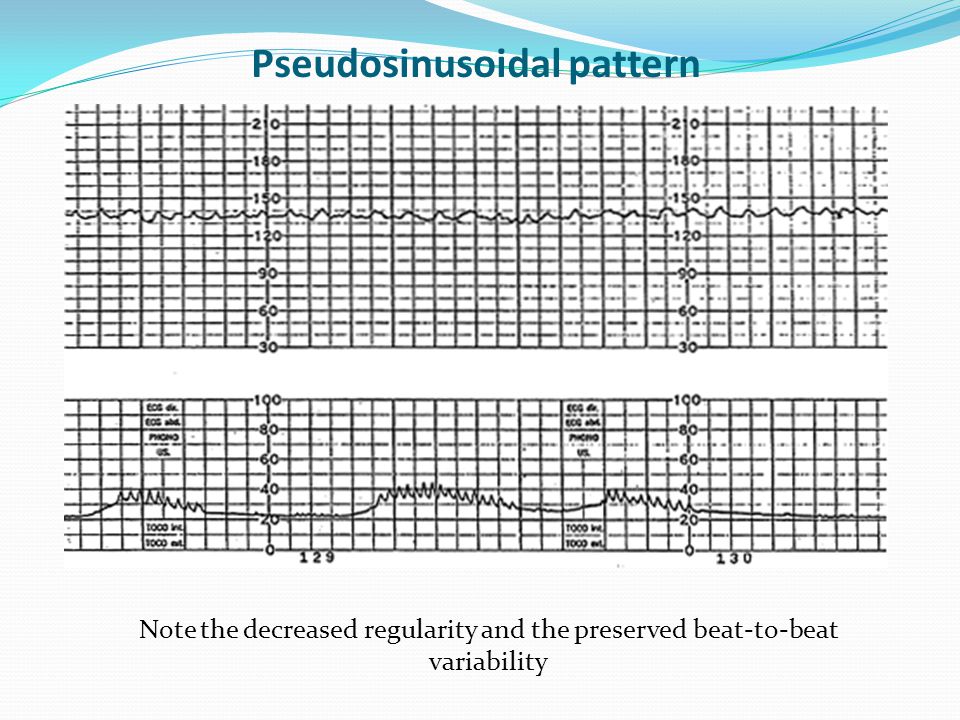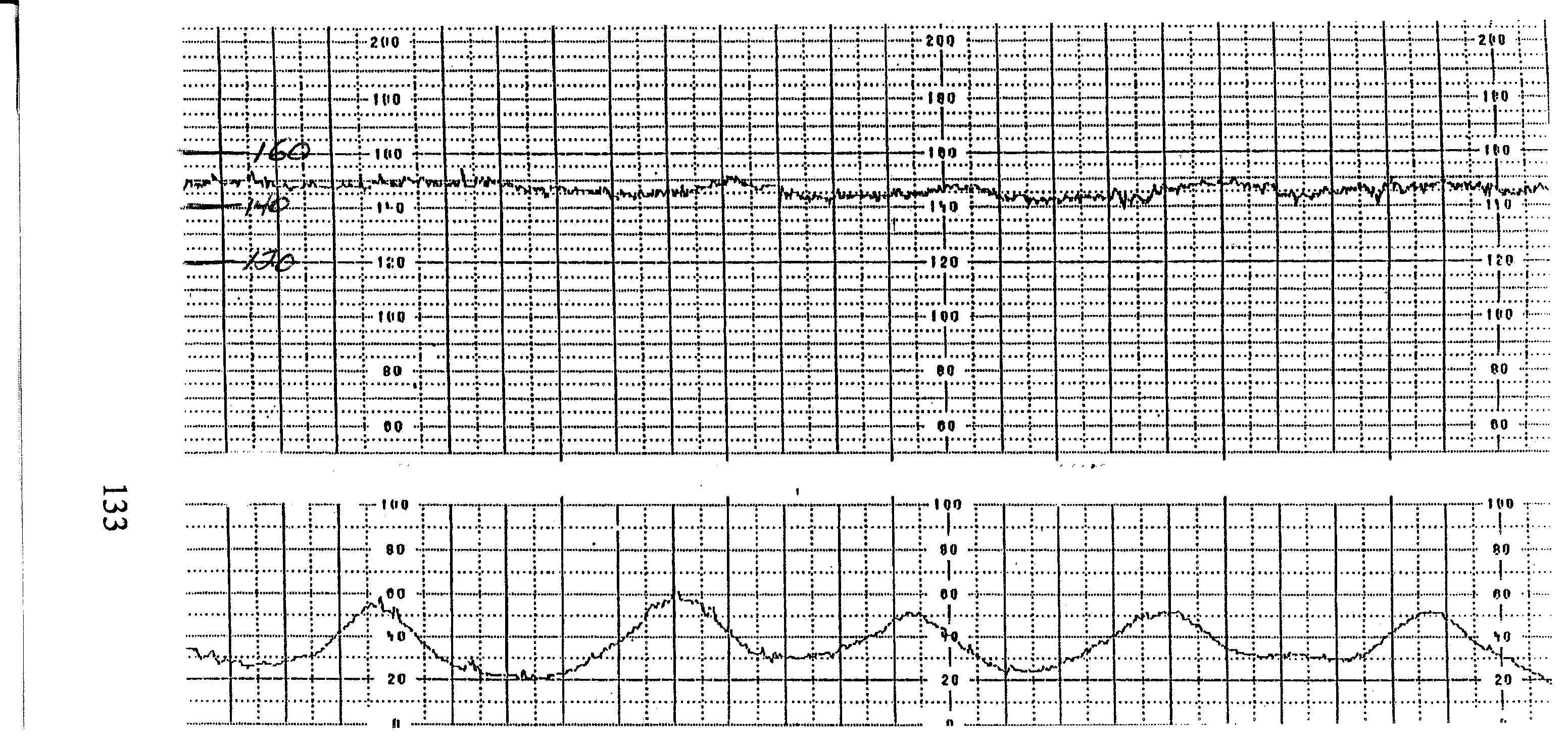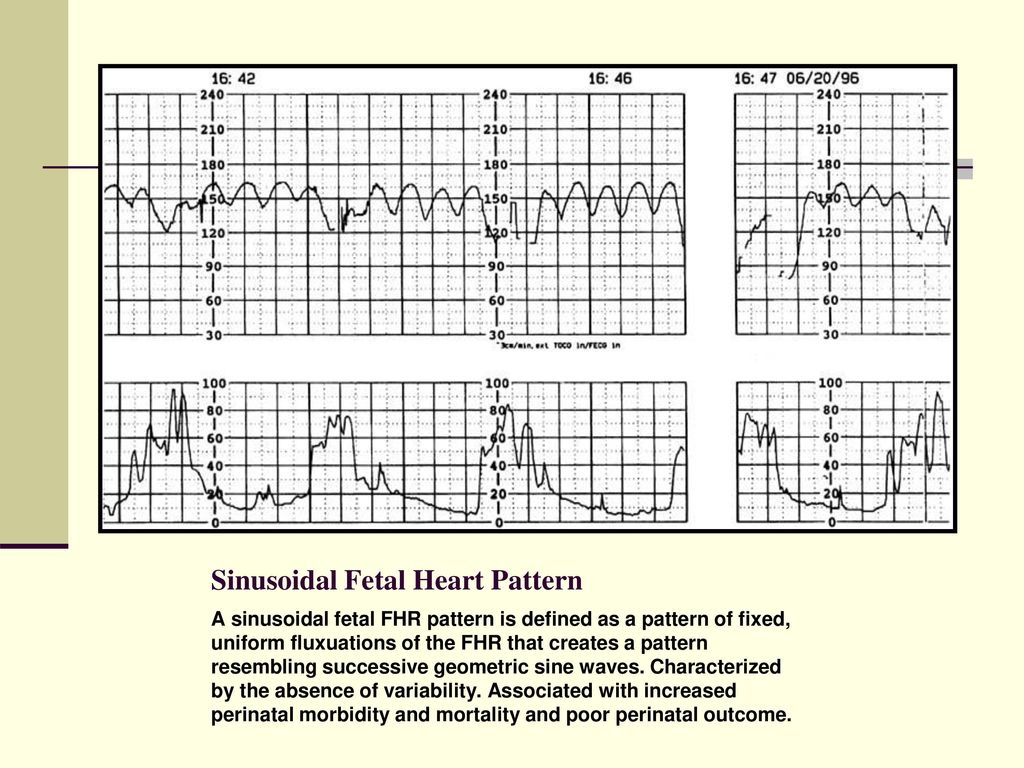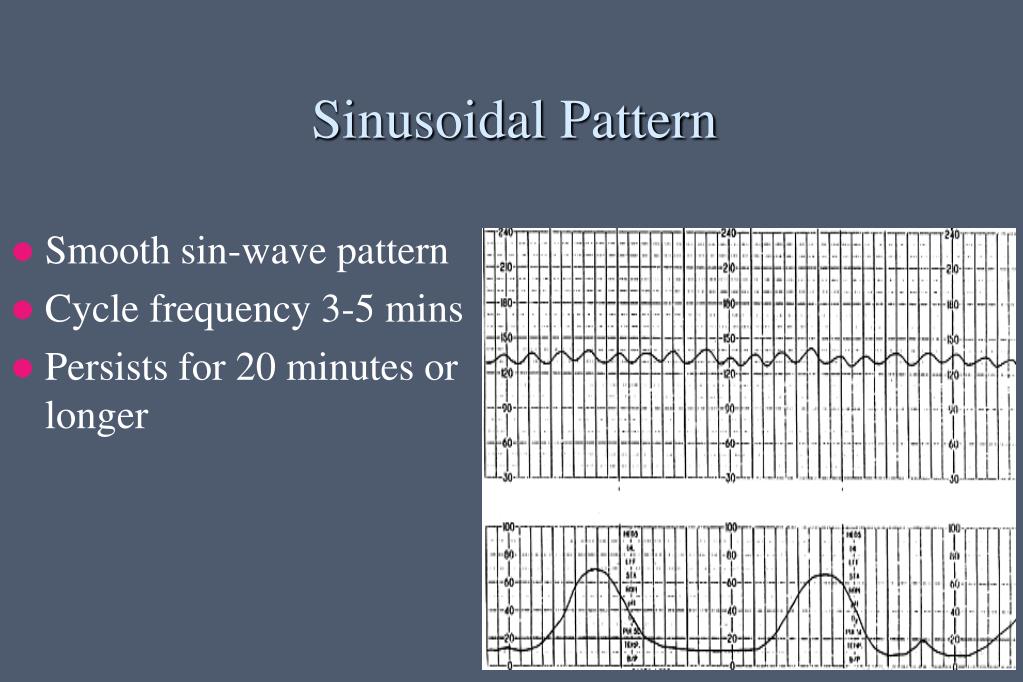Fhr Sinusoidal Pattern - A regular, smooth, undulating signal, resembling a sine wave, with an amplitude of 5−15 bpm, and a frequency of 3−5 cycles per. The fetal heart rate (fhr) pattern helps to distinguish the former from the latter as it is an indirect marker of fetal cardiac and central. On the basis of this definition, 27 tracings were classified as true shr patterns and all were associated with significant fetal or neonatal. Described an undulating wave form alternating with a flat or smooth baseline fetal. Reports on fluctuating fetal heart rate (fhr) patterns, which have been called sinusoidal fhr patterns in the literature, have been critically. In 1972, manseau et al.
A regular, smooth, undulating signal, resembling a sine wave, with an amplitude of 5−15 bpm, and a frequency of 3−5 cycles per. In 1972, manseau et al. On the basis of this definition, 27 tracings were classified as true shr patterns and all were associated with significant fetal or neonatal. The fetal heart rate (fhr) pattern helps to distinguish the former from the latter as it is an indirect marker of fetal cardiac and central. Reports on fluctuating fetal heart rate (fhr) patterns, which have been called sinusoidal fhr patterns in the literature, have been critically. Described an undulating wave form alternating with a flat or smooth baseline fetal.
Described an undulating wave form alternating with a flat or smooth baseline fetal. In 1972, manseau et al. The fetal heart rate (fhr) pattern helps to distinguish the former from the latter as it is an indirect marker of fetal cardiac and central. On the basis of this definition, 27 tracings were classified as true shr patterns and all were associated with significant fetal or neonatal. A regular, smooth, undulating signal, resembling a sine wave, with an amplitude of 5−15 bpm, and a frequency of 3−5 cycles per. Reports on fluctuating fetal heart rate (fhr) patterns, which have been called sinusoidal fhr patterns in the literature, have been critically.
characteristics of a sinusoidal pattern highlighted on the caseCTG
The fetal heart rate (fhr) pattern helps to distinguish the former from the latter as it is an indirect marker of fetal cardiac and central. In 1972, manseau et al. Reports on fluctuating fetal heart rate (fhr) patterns, which have been called sinusoidal fhr patterns in the literature, have been critically. A regular, smooth, undulating signal, resembling a sine wave,.
Sinusoidal fetal heart rate
A regular, smooth, undulating signal, resembling a sine wave, with an amplitude of 5−15 bpm, and a frequency of 3−5 cycles per. In 1972, manseau et al. Described an undulating wave form alternating with a flat or smooth baseline fetal. The fetal heart rate (fhr) pattern helps to distinguish the former from the latter as it is an indirect marker.
What Is A Sinusoidal Pattern
On the basis of this definition, 27 tracings were classified as true shr patterns and all were associated with significant fetal or neonatal. In 1972, manseau et al. Described an undulating wave form alternating with a flat or smooth baseline fetal. The fetal heart rate (fhr) pattern helps to distinguish the former from the latter as it is an indirect.
Sinusoidal fetal heart rate
The fetal heart rate (fhr) pattern helps to distinguish the former from the latter as it is an indirect marker of fetal cardiac and central. A regular, smooth, undulating signal, resembling a sine wave, with an amplitude of 5−15 bpm, and a frequency of 3−5 cycles per. Reports on fluctuating fetal heart rate (fhr) patterns, which have been called sinusoidal.
Sinusoidal Fhr Pattern
The fetal heart rate (fhr) pattern helps to distinguish the former from the latter as it is an indirect marker of fetal cardiac and central. In 1972, manseau et al. On the basis of this definition, 27 tracings were classified as true shr patterns and all were associated with significant fetal or neonatal. Described an undulating wave form alternating with.
Sinusoidal fetal heart rate
On the basis of this definition, 27 tracings were classified as true shr patterns and all were associated with significant fetal or neonatal. A regular, smooth, undulating signal, resembling a sine wave, with an amplitude of 5−15 bpm, and a frequency of 3−5 cycles per. Reports on fluctuating fetal heart rate (fhr) patterns, which have been called sinusoidal fhr patterns.
Fhr threadsdiy
A regular, smooth, undulating signal, resembling a sine wave, with an amplitude of 5−15 bpm, and a frequency of 3−5 cycles per. Described an undulating wave form alternating with a flat or smooth baseline fetal. In 1972, manseau et al. The fetal heart rate (fhr) pattern helps to distinguish the former from the latter as it is an indirect marker.
Sinusoidal fetal heart rate
The fetal heart rate (fhr) pattern helps to distinguish the former from the latter as it is an indirect marker of fetal cardiac and central. On the basis of this definition, 27 tracings were classified as true shr patterns and all were associated with significant fetal or neonatal. Reports on fluctuating fetal heart rate (fhr) patterns, which have been called.
An example of FHR deceleration is shown by aperture of FHR curve, where
A regular, smooth, undulating signal, resembling a sine wave, with an amplitude of 5−15 bpm, and a frequency of 3−5 cycles per. The fetal heart rate (fhr) pattern helps to distinguish the former from the latter as it is an indirect marker of fetal cardiac and central. Reports on fluctuating fetal heart rate (fhr) patterns, which have been called sinusoidal.
Sinusoidal fetal heart rate
The fetal heart rate (fhr) pattern helps to distinguish the former from the latter as it is an indirect marker of fetal cardiac and central. Reports on fluctuating fetal heart rate (fhr) patterns, which have been called sinusoidal fhr patterns in the literature, have been critically. In 1972, manseau et al. A regular, smooth, undulating signal, resembling a sine wave,.
Described An Undulating Wave Form Alternating With A Flat Or Smooth Baseline Fetal.
The fetal heart rate (fhr) pattern helps to distinguish the former from the latter as it is an indirect marker of fetal cardiac and central. A regular, smooth, undulating signal, resembling a sine wave, with an amplitude of 5−15 bpm, and a frequency of 3−5 cycles per. On the basis of this definition, 27 tracings were classified as true shr patterns and all were associated with significant fetal or neonatal. Reports on fluctuating fetal heart rate (fhr) patterns, which have been called sinusoidal fhr patterns in the literature, have been critically.

